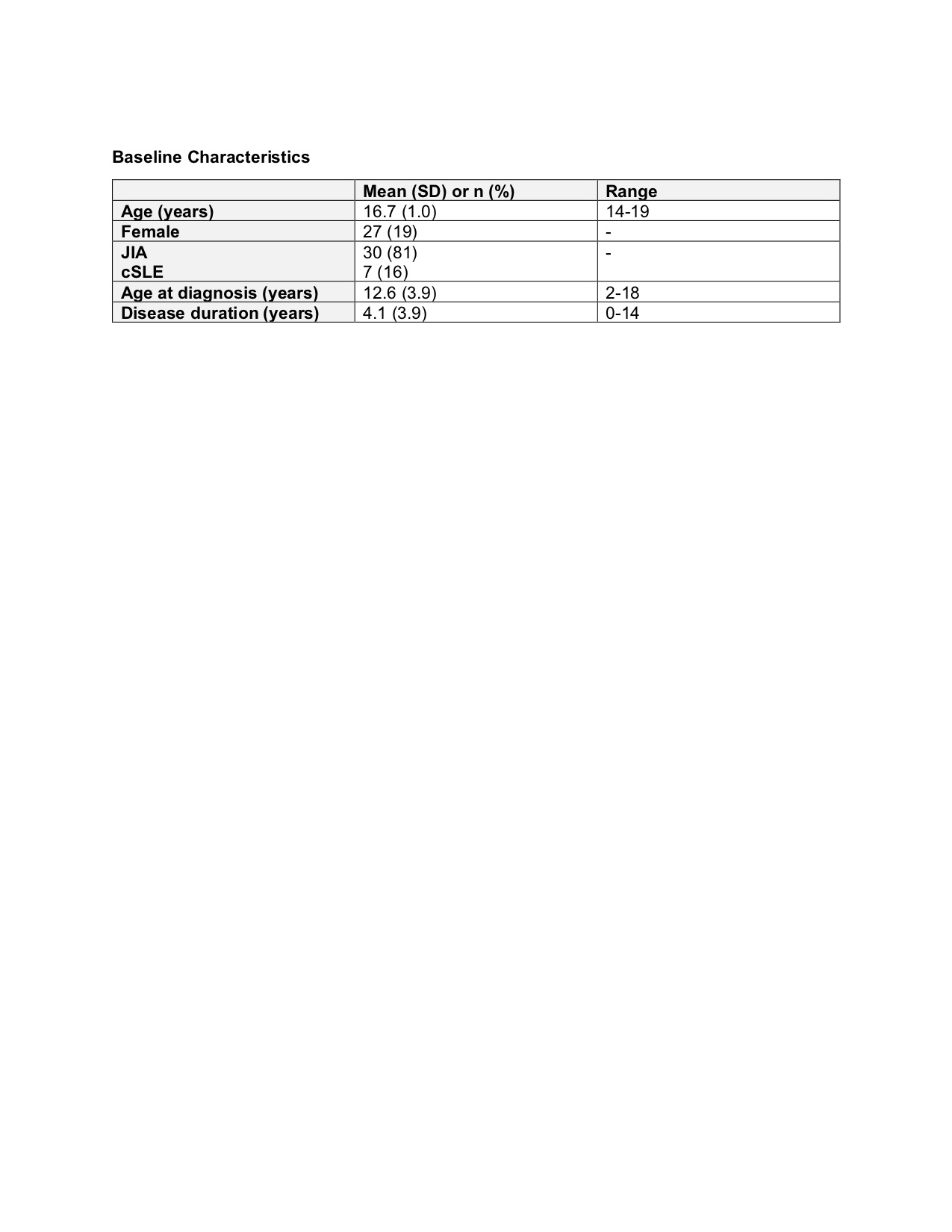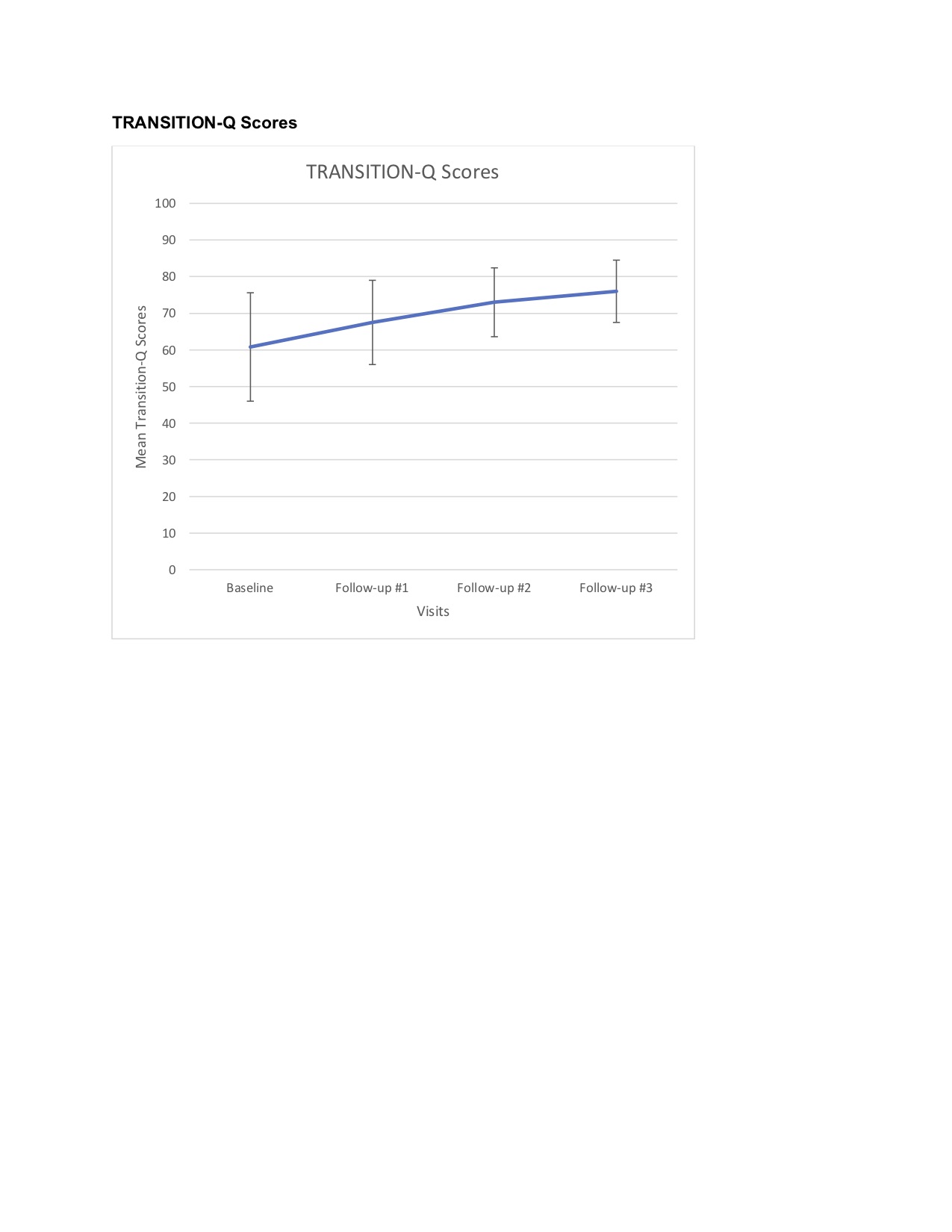Session Information
Date: Monday, November 9, 2020
Title: Pediatric Rheumatology – Clinical Poster III: SLE, Vasculitis, & JDM
Session Type: Poster Session D
Session Time: 9:00AM-11:00AM
Background/Purpose: The transition from pediatric to adult rheumatology care is associated with increased morbidity, mortality and loss to follow-up. This is largely due to a dramatic change in expectations as patients move from a family-centred, multidisciplinary pediatric care model to adult care models, which require independence and active engagement by the patient. Thus, adolescents must acquire sufficient self-management skills in order to successfully navigate the adult health care system independently. Comprehensive transition programs must recognize the variability in transition preparedness among similarly-aged individuals and allow for individualized intervention accordingly. The objective of our study was to assess the impact of goal-setting on changes in transition-readiness among adolescents with JIA and jSLE.
Methods: Patients (age 14-19) with JIA and jSLE were recruited from pediatric and young adult rheumatology transition clinics at a single academic institution. To assess transition readiness, each participant completed the TRANSITION-Q questionnaire. This self-administered, validated, 14-item questionnaire (max score = 100) is used to assess healthcare self-management skills as a proxy for preparedness for transition from pediatric to adult care. Participants completed the TRANSITION-Q at the time of consent and at all subsequent follow-up visits thereafter. Time between visits was at the physicians’ discretion. Upon completion of the TRANSITION-Q at each appointment, goals were established with multidisciplinary care members in areas identified as needing improvement based on the participants’ responses. Descriptive statistics were summarized for patient characteristics at baseline and for TRANSITION-Q scores at each time point.
Results: Among 37 respondents, 10 were male and 23 were female (mean (SD) age 16.7 (1.0) years); n=30 JIA (81%), n=7 jSLE (19%). Thirty-two participants were seen twice (mean (SD) follow-up time 6.4 (2.5) months),14 were seen 3 times (mean (SD) time from first to second follow-up 3.4 (1.7) months) and 2 were seen 4 times (mean(SD) time from second to third follow-up 2.8 (2.0) months). Mean (SD) TRANSITION-Q scores at baseline and 3 follow-ups were 60.8 (14.8), 67.5 (11.5), 73.0 (9.4), and 76.0 (8.5), respectively.
Conclusion: We observed increases in TRANSITION-Q scores over time in this cohort. Goal setting and using a validated tool to track self-management skills may be particularly beneficial as self-management skills appeared to improve over time among our patient population.
To cite this abstract in AMA style:
Semalulu T, Beattie K, McColl J, Alam A, Thomas S, Herrington J, Gorter J, Cellucci T, Garner S, Heale L, Matsos M, Batthish M. Goal-Setting Improves Transition Readiness in Adolescents with Juvenile Idiopathic Arthritis and Systemic Lupus Erythematosus [abstract]. Arthritis Rheumatol. 2020; 72 (suppl 10). https://acrabstracts.org/abstract/goal-setting-improves-transition-readiness-in-adolescents-with-juvenile-idiopathic-arthritis-and-systemic-lupus-erythematosus/. Accessed .« Back to ACR Convergence 2020
ACR Meeting Abstracts - https://acrabstracts.org/abstract/goal-setting-improves-transition-readiness-in-adolescents-with-juvenile-idiopathic-arthritis-and-systemic-lupus-erythematosus/


